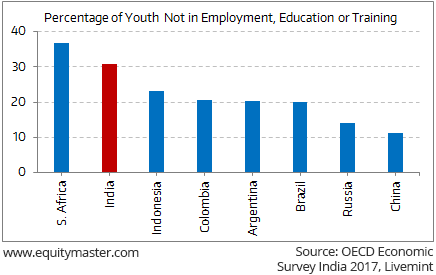Investment in securities market are subject to market risks. Read all the related documents carefully before investing
Grab Our Small Cap Recommendation
Service at a 60% Discount
- Home
- Todays Market
- Indian Stock Market News June 5, 2017
Sensex Trades Marginally Higher; Consumer Durables Sector Up 5.9% Mon, 5 Jun 11:30 am
Indian share markets are presently trading marginally higher. Sectoral indices are trading on a positive note with stocks in the consumer durables sector and realty sector witnessing most of the buying interest.
The BSE Sensex is trading up 60 points (up 0.2%), while the NSE Nifty is trading up by 24 points (up 0.2%). The BSE Mid Cap index is trading up by 0.4%, while the BSE Small Cap index is trading up by 0.8%. The rupee is trading at 64.35 to the US$.
Indian share markets are trading on a volatile note today. Most of this volatility is seen ahead of the Reserve Bank of India (RBI) monetary policy review this week. Volatility is also seen on the back of release of some key macroeconomic data and updates on monsoon rains.
As per the consensus, the RBI will most likely hold interest rates in its monetary policy review this week. However, it is expected that the Monetary Policy Committee (MPC) of central bank may lower its inflation forecast.
The RBI has projected inflation to average 4.5% April and September, and 5% in the latter half. However, as has been seen from the recent data releases, India's retail price gauge has dropped to a record low of 2.99% in April. This was seen because of the base effect and lower food prices during the month of April.
However, market participants will look forward to RBI's commentary on inflation. This is because the implementation of GST and monsoon are about to have an impact on the inflation trajectory in the coming months.
In the news from global financial markets, a senior official at the International Monetary Fund (IMF) said that China's credit growth, among other things, could pose a risk to Asia.
As per the IMF, a lack of clarity about the size of an expected US fiscal stimulus and China's rapid domestic credit growth are among risks that cloud Asia's economic outlook.
The above comments come days after ratings agency Moody's reported that China's structural reforms will not be enough to arrest its rising debt. It also said that another credit rating downgrade for the country is possible if the country doesn't get its ballooning credit in check.
One shall note that Moody's Investors Service has downgraded China's sovereign ratings by one notch to A1. The agency expects the financial strength of the world's second-largest economy to erode in coming years as growth falters and debt continues to rise.
Many economists are of the view that central bank stimulus measures are masking the deeper problems of industrial overcapacity and high levels of corporate debt in China.
However, despite these concerns, a recent issue of Vivek Kaul's Inner Circle (requires subscription) claims there are plenty of legs left on the dragon economy. The issue points out some positive signs emerging in the Chinese economy, without undermining the longer-term risks and challenges.
Regarding stock markets, many participants are worried that China and its slowing economy will bring more concerns for Indian markets. However, a crash can be an ideal time to bet on solid Indian companies that are well-shielded from adverse developments in China. As our friends at Equitymaster say, these companies can turn into bargain buying opportunities.
In other news, as per a recent report released by Assocham, India's information technology and IT-enabled services (ITeS) sector may add at best one million jobs in the next five years. According to the report, building, construction and real estate, including infrastructure, sector would require 31.1 million incremental jobs. Besides, organised retail can create incremental level of at least 10-12 million new jobs in the next five years, while textiles and clothing can also be a potential area of job creation, the report added.
While the above estimates come as a welcome breather, one shall note that at present, over 30% of India's youth is unemployed, as can be seen from the chart below:
Demographic Disaster in the Making
One shall note that we have a big unemployment crisis which can derail the growth of the Indian economy. And the situation of unemployment over the past many years has hardly changed.
As per Vivek Kaul's analysis, a little over 12 million individuals will keep joining the workforce every year in the years to come. This works out to around one million a month. And at this rate, the Indian workforce is expected to be larger than that of China by 2030.
The demographic dividend benefits a country if the government of the day is able to create the right environment in which jobs are created. And from what we see, we are failing miserably on this front.
But this is not the only crisis hitting India's economy now. To know more, refer to Vivek's special report.
For information on how to pick stocks that have the potential to deliver big returns, download our special report now!
Read the latest Market Commentary



Equitymaster requests your view! Post a comment on "Sensex Trades Marginally Higher; Consumer Durables Sector Up 5.9%". Click here!
Comments are moderated by Equitymaster, in accordance with the Terms of Use, and may not appear
on this article until they have been reviewed and deemed appropriate for posting.
In the meantime, you may want to share this article with your friends!